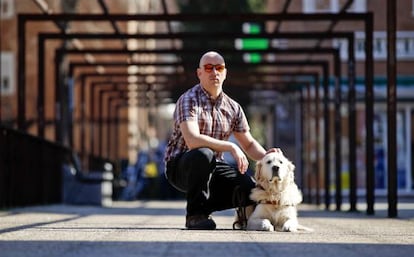Blind father denied shared custody of his three small children
Madrid court had granted him generous visitation rights


Raúl Fernández moves effortlessly around his neighborhood of Valdezarza, in the north of Madrid. True, he gets some help from Roy, his seeing-eye dog. Fernández, who is legally blind — he only has five percent vision in one eye — has been fighting a court battle for the last three years to get shared custody of his children.
A ruling rejected his claim, saying that Fernández “suffers from a visual impairment that makes it difficult to take care of three children.”
Had he been successful, he would have been able to spend 15 days a month with them, rather than the 12 he does now.
Fernández, 41, has the typical worries any father feels when he is in charge of the kids - but none relating to his visual impairment. The three children, aged six, four and three, spend every Tuesday and Thursday with him, as well as every other weekend. He also gets to spend half of their vacation time with them. These generous visitation rights were awarded to him by the same judge who now denies his right to shared custody, which would raise the days he would be able to see them from 12 to 15 a month.
Without my saying anything, my kids tell me to be careful when we cross the street”
Fernández wonders why he is apparently capable of caring for his kids on some days, but not on others.
The ruling specifies that because the children are so young, the best thing for them is to remain with their mother. It also adds that Fernández himself admitted he cannot properly care for the youngest.
“I never said that. I need the same kind of help as any other person in charge of three kids,” he says indignantly. “If I was able to care for my two other daughters, why would I not be able to deal with this one kid?”
He has adapted his life to his children, down to the smallest details. “I have made marks on the syringes of every medication they take, so just by feeling them I know how much I am giving them,” he says.
But Fernández wants to provide as much security as he can, so he has asked city authorities to provide a caregiver to spend a few hours at home, helping him out.
“While I give them a bath, she could fix dinner,” he notes.
I am all alone in Madrid; I’m only here because of my kids, they are my only joy”
But Fernández does not need anybody to go out for a walk with his three kids. He takes them to the park, and even to the movies.
“Last week we went to see a film for the first time, and they loved it. They are aware of what's going on, and without my saying anything, they tell me to be careful when we’re about to cross the street.”
The man has appealed the court decision unsuccessfully. He pays his wife 750 euros a month in alimony, while his job selling lottery tickets for ONCE, the national blind people’s association, brings in 1,100 euros a month, he says (the court ruling indicates it is about 1,600 euros in 14 paychecks a year). He pays 600 euros in rent, so his relatives back in his native Asturias are helping him out financially. He says he cannot move into a cheaper apartment because he needs the extra space for his children.
Moving to a different location would also be very challenging for him. “I have memorized every street and every lamppost, and here I am nearer my children,” he explains.
But after a three-year legal wrangle, his spirit is beginning to falter. Fernández says he is claiming his rights as a father, since there is no law that says his disability is a reason to deny him shared custody. He sought help from several parent associations and tried to see the judge up to five times, to no avail. Now he has no money left to keep trying. “The lawyers took all of my savings,” he says.
The ruling includes a psychologist's report on Fernández’s relationship with his children. “They feel very attached to him,” it reads. Fernández knows it off by heart. He says it is his love for his kids that keeps him fighting.
“I am all alone in Madrid; I’m only here because of my kids, they are my only joy. If they don’t let me be with them, what is left for me?”
Yet ONCE, his employer and a champion of the rights of people with disabilities, thinks the ruling was fair. “There have been other, similar cases, but this time it is hard to claim discrimination,” said a spokesperson. “It is a generous agreement that is beneficial to both parties, and there is no clear discrimination in it.”
ONCE: a just decision
ONCE, the Spanish national blind people’s association, was one of the organizations that Raúl Fernández sought help from. The association terms any decision that denies rights to a person because of their disability as “devastating,” but has sided with the courts over the ruling denying joint custody of Fernández’s three children.
When ONCE learned of Fernández’s situation, the association went to the Spanish Committee for the Representation of People with Disabilities (CERMI) to ask that his case be examined. This organization said that the current custody award was generous and beneficial to both parties, and that no clear indication of discrimination was evident within it.
CERMI went on to explain that such rulings are commonplace when the children in question are of such a young age.
“The only option open to the father is to request a change to the conditions,” says a CERMI spokesman. At the time of the initial custody ruling Fernández’s youngest child was one; now she is approaching her fourth birthday: “So joint custody could be awarded.” But as Fernández notes: “If I live on less than 600 euros a month, how am I going to pay for lawyers?”
Tu suscripción se está usando en otro dispositivo
¿Quieres añadir otro usuario a tu suscripción?
Si continúas leyendo en este dispositivo, no se podrá leer en el otro.
FlechaTu suscripción se está usando en otro dispositivo y solo puedes acceder a EL PAÍS desde un dispositivo a la vez.
Si quieres compartir tu cuenta, cambia tu suscripción a la modalidad Premium, así podrás añadir otro usuario. Cada uno accederá con su propia cuenta de email, lo que os permitirá personalizar vuestra experiencia en EL PAÍS.
¿Tienes una suscripción de empresa? Accede aquí para contratar más cuentas.
En el caso de no saber quién está usando tu cuenta, te recomendamos cambiar tu contraseña aquí.
Si decides continuar compartiendo tu cuenta, este mensaje se mostrará en tu dispositivo y en el de la otra persona que está usando tu cuenta de forma indefinida, afectando a tu experiencia de lectura. Puedes consultar aquí los términos y condiciones de la suscripción digital.








































